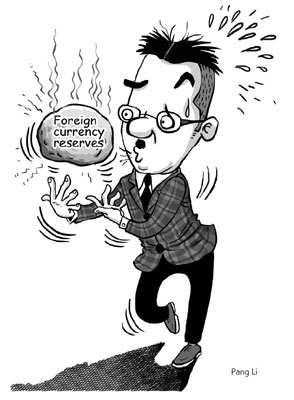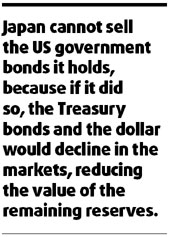Soaring foreign reserves pose serious risks
(China Daily)
Updated: 2008-03-21 07:24
Updated: 2008-03-21 07:24
Japan's foreign currency reserves amounted to about $1.01 trillion as of the end of February, topping $1 trillion (about 105 trillion yen) for the first time. The risk of holding such a large amount of foreign currency reserves is considerable, and steps should be taken to reduce the reserves.

Japan is the second country in the world to surpass the $1 trillion line following China, which holds about $1.5 trillion in foreign currency. Next on the list comes Russia and India. Japan is the only developed country to hold such vast foreign currency reserves.
Such reserves are held by a government and a central bank for settlement of trade transactions and for payment of overseas debts.
In the case of Japan, the government and the Bank of Japan carried out massive yen selling and dollar buying operations in 2003 through early 2004 to stop steep appreciation of the yen. As a result, the government accumulated a sizeable amount of dollar-based assets.
Japan has not conducted similar market intervention since the spring of 2004, but it manages about 90 percent of its foreign currency reserves in dollar-based assets, including US Treasury notes and bonds. With gains earned from managing such dollar-based assets and the increase in the value of US Treasuries, the nation's foreign currency reserves have ballooned.
Management of such assets has produced a yield of about 4 percent per annum and it is reported that profits from managing the foreign reserves have topped 3 trillion yen a year.
What should be noted is that foreign currency reserves are not net assets for the nation and the reserves have increased with borrowing.
The government issues short-term securities known as financial bills (FBs) to procure funds in yen from financial and other institutions. Then, it sells the yen and buys dollars.
With the increase in the foreign currency reserves, the outstanding balance of the FBs also has increased to total about 102 trillion yen. This is all Japan's debts.
Moreover, if the dollar's depreciation continues, yen-calculated values of dollar-based assets will decline, further deteriorating the nation's fiscal condition. When US government bonds can be managed with high interest rates, profits can be expected. But if interest rates in the United States and Japan are reversed, foreign currency reserves will incur losses.

Japan now faces a situation in which it cannot sell the US government bonds it holds, because if it did so, the Treasury bonds and the dollar would decline in the markets, reducing the value of the remaining reserves.
The nation seems to be in a dead-end in that it has no adequate way to deal with the ballooning foreign currency reserves while risks connected to foreign exchange and interest rates can only heighten.
Some members of the Liberal Democratic Party have started studying the possibility of Japan establishing a sovereign wealth fund financed by the foreign currency reserves and other resources.
However, the government must be extremely careful in creating such a fund bankrolled with borrowed money from the foreign currency reserves. Many issues must be addressed, including whether profits can be earned through careful management and who should be responsible when losses are incurred.
But it is also problematic if the expanding foreign currency reserves are left unaddressed and the reserves continue to be top-heavy with the US government bonds.
Hopefully, the foreign currency reserves and outstanding balance of FBs can be reduced with a minimum of risk and without sparking chaos in the markets. In the wake of the nation's foreign currency reserves having topped the $1 trillion mark, discussions must be held to address these matters.
The Yomiuri Shimbun
(China Daily 03/21/2008 page9)
|
|
|
|